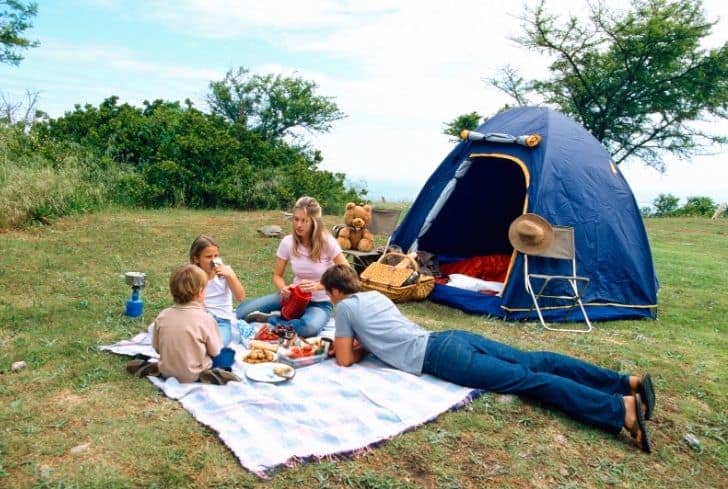Today we show you a number of ways in which you go greener when you go caravanning. You might be pleasantly surprised at just how easily this can be achieved!
So, how does a caravan enthusiast go about helping to save the planet? Firstly, and perhaps a little surprisingly it should start with your choice of caravan insurance!
Did you know that some online caravan insurance providers like Towergate have developed a policy that promises to discount on carbon-neutral caravan holidays?
Their policy is provided as a ‘web-only’ product, and as a result, the savings made in postage and processing time are to be used to offset the policyholders’ caravan-related carbon emissions at no extra cost to the customer.
Buying A Caravan
If you are in the market for a caravan, there are a number of things you can think about to try to improve your eco credentials:
- Aerodynamics and Weight: Both the weight and the aerodynamics of a caravan impact the amount of carbon produced when towing. The lighter and more aerodynamic the vehicle the smaller and more eco-friendly car can be used to tow it.
- Make and Model: Caravan manufacturers such as Baileys (whose caravans are 75% recyclable) have become increasingly eco-aware and have made efforts to improve their caravans. Increasingly recycling schemes and green manufacturing techniques are being introduced, so when looking for a new caravan include this in your research.
- Insulation: Ensure the caravan is well insulated, as poor insulation can greatly affect the amount of CO2 produced to regulate the temperature of the caravan. Also bear in mind that the less corrosive the shell of the caravan is the longer it will last which will, in turn, defer the energy required in manufacture.
- Power: Solar panels are a good option, reducing the reliance on generators and batteries. These also prove to be cheaper over the long term.
Towing Tips
There are a number of things you can do regarding towing the caravan to reduce the number of carbon emissions you create:
- Regular servicing: This will help ensure that your car is using fuel as efficiently as possible
- Turn off your engine: Should you find yourself stuck in a traffic jam and you are obviously not going to be moving for a while, then make sure you turn off your engine. This is a good idea to cut your emissions even when you are not towing a caravan
- Roof box: Choose a profiled roofbox for your car as this can help the overall dynamics of your rig. And be sure to remove any roofbars when not in use
We recommend The Thule Roofbox, which you can buy on Amazon:
Thule 629201 Roof Boxes Motion XT, Black Glossy, Size M

- Optimized design for best space efficiency, aerodynamics, and vehicle fit
- Easy to mount thanks to the extra wide, pre-installed PowerClick quick-mount system. The integrated torque indicator “clicks” when it’s properly mounted, ensuring fast and secure fitting
- Easy to open and close in all conditions due to grip-friendly outer handles and supporting lid lifters
- SlideLock system with separate locking and opening functions, automatically locks the lid in place and indicates when the box is closed securely
- The right tow car: It is important that your caravan and car are correctly matched to ensure the efficiency of your towing. You should check with the car and caravan manufacturers for recommendations and guidance
- Carry less water: Some people carry gallons of the stuff many, many miles, which is unnecessary. Reducing the amount lowers the weight you are towing and will result in using less fuel. The best idea is to fill your tanks when you get to your destination
- Drive sensibly: Avoid trying to pull off like Louis Hamilton from the lights, and be sure to increase your speed gradually as this is more fuel efficient
- Avoid the rush hour: Try to plan your trips so you are not travelling during the rush hour if at all possible. Also, try to plan your route to avoid stop/start traffic to enable you to travel at a steady speed
- Check your tyre pressure: Having the wrong pressure in your tyres causes your car to use more fuel, and can result in creating an unnecessary extra 10 kilos of Carbon Dioxide for every 500 miles you travel
AA 12V Digital Tyre Inflator


- Maintain the correct tyre pressures for your vehicle
- 3m power cable, 52cm air hose, 12V adaptor, integral LED lamp
- Displays PSI, BAR and KPA to a maximum of 120 PSI or 8.3 BAR or 827 KPA
- 197 x 67 x 159mm and weight 800g
- A range of adaptors are included
- Slow down: Reducing your speed by 10mph will result in a substantial reduction in the amount of CO2 you produce per mile
- Switch to LPG: This costs approximately £1700, but the fuel costs half the price of regular petrol. It is increasingly available at the pumps, and after conversion, the vehicle will still be able to use standard fuel if necessary
- Use BioDiesel: If you have a diesel car then fill it with BioDiesel instead of standard diesel. It is made from sustainable vegetable material, which is normally mixed in with ordinary diesel. Your car doesn’t need converting to be able to use it
Think About Your Choice Of Site
The green bug has even bitten Caravan sites themselves, backed by both the Caravan Club and the Camping And Caravanning Club. The latter have increased energy efficiency and recycling, introduced eco-friendly materials, and included more honeycomb grid hardstanding which enables the grass to grow. This post is sponsored by our partners.
Indeed its Windermere site has been hailed by The Guardian newspaper as Britain’s “most environmentally friendly site”.
You Might Be Interested In: The Best Caravan Awnings For The 2022 Season
There is even an award scheme for environmentally friendly sites. The scheme, set up in 1996 in a joint venture between conservationist David Bellamy and the British Holiday and Home Parks Association saw 620 sites receiving an award this year. There are three levels of the award that a site can earn, these being Bronze, Silver, or Gold.
You can hunt for one of these sites at bellamyparks.co.uk.
Finally, there are a number of general things you can do to become more environmentally aware, that is not necessarily caravan related, but which are relevant to caravan holidays:
- The newer the caravan the better as caravans have become increasingly better insulated over the years
- Save fuel on heating by wearing an extra layer rather than notching the heating up
- Recycle your plastic bags, by using them for multiple shopping trips, or as waste sacks
- Increase the insulation in the caravan by using polystyrene wall linings in wardrobes and cupboards, and under seating
- Make sure you use charcoal from sustainable sources when barbecuing. These will have the Forest Stewardship Council (FSC) recommendation on them
- Only boil as much water as you are going to use
- If your site doesn’t have recycling facilities, make the effort to take your waste to municipal recycling points while on your way home. These can often be found in supermarket car parks.
- Use low-energy bulbs and turn off lights and electrical equipment when not in use
- Do the washing up with the hot water you used to boil an egg
- Ideally buy a compost toilet, but failing that buy toilet fluid products – such as Thetford’s Aqua Kem Green – which are formaldehyde-free
- On-site sinks are deeper and need more water to wash the dishes than doing them in the caravan
- Buy yourself a solar-powered or a wind-up radio
- For less than £10 you can buy a wind-up mobile phone charger
- Try to walk, cycle or use public transport more when on holiday. Leave the car behind at the site
- You can become self-sufficient in terms of 12-volt electricity if you install portable solar panels (this can cost over £400)
- Use biodegradable cleaning products
- Hold onto things that are compostable for the heap at home. Things like card food containers and Egg cartons
- Separate your metal, glass and paper waste. Recycling all the aluminium cans in the UK would result in 12,000,000 fewer dustbins full of waste a year, and 17 trees can be saved for each ton of recycled paper
- Buy locally produced food from local bakers, farm shops, and farmers’ markets. This reduces the number of lorries on our roads
So there you have it, a brief but I hope useful list of ways you can reduce your carbon footprint while making the most of your caravan holiday. Admittedly some of these require investment up-front, but even putting those aside, there are many cheap and even free ways of improving your green credentials.
I hope you are able to put at least some of these into action, as you will feel good about making an effort to protect the planet for future generations (of caravanners hopefully).
Happy Caravanning!


![Your eco-friendly caravan travelling experience [Ultimate Guide] | Ourgoodbrands](https://ourgoodbrands.com/wp-content/uploads/2021/07/eco-friendly-caravan-travelling-ultimate-guide6.jpg)